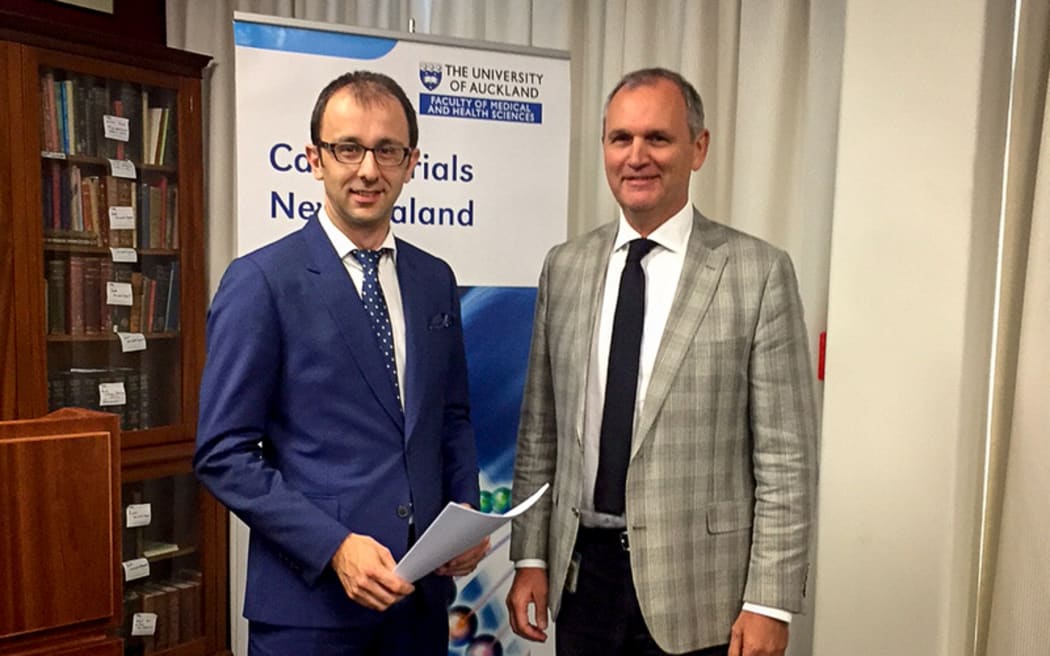A third of patients with bowel cancer in this country don't find out they have the disease until they reach a hospital emergency department.

Dr Chris Jackson, left, and Professor Michael Findlay. Photo: SUPPLIED
That's one of many key findings in a major study released today highlighting gaps in bowel cancer treatment in New Zealand.
Another is that less than half of patients with advanced, or stage four, disease receive life-prolonging chemotheraphy.
As well, only 60 percent of patients with bowel cancer that has spread to nearby lymph nodes receive chemotherapy - compared with 74 percent in Australia.
Bowel cancer is the most commonly diagnosed cancer in New Zealand and the second-leading cause of cancer-related death, killing 1200 New Zealanders a year. The incidence, with 3030 new diagnoses in 2011, is one of the highest in the developed world, with survival rates worse than in Australia.
The three-year study -- known as the PIPER project -- received $1 million in funding from the Health Research Council and the Ministry of Health, and was led by Auckland University Professor of Oncology Michael Findlay. It involved a national review of patient notes and databases for 5600 patients diagnosed with bowel cancer in 2007 and 2008, and Maori and Pacific cases.
It said 34 percent of patients with bowel cancer presented to the emergency department, compared with 21 percent in Britain, and that further work was needed to understand why; 22 percent already had a blockage when they reached hospital.
The proportion of patients diagnosed with colon cancer and rectal cancer which had spread - 24 percent and 19 percent respectively - in New Zealand was higher than the 17 percent for both in Britain, and the 19 and 17 percent respectively in Australia.
Rates were particularly high for Maori and Pacific patients, at 32 percent and 35 percent respectively.
The study said this "stage distribution" seen in New Zealand was one of a population which is not screened for bowel cancer.

Photo: Pixabay
Professor Findlay told Radio New Zealand that, for comparison, preliminary data from the pilot bowel cancer screening programme at Waitemata District Health Board showed just 8 percent of patients presented there with advanced, or stage four, disease.
"So it does make one wonder whether we are missing up to 15 percent of patients that are presenting with late stage disease with poor outcome, whether they could be picked up earlier."
Project clinical leader Christopher Jackson, an oncologist, told Radio New Zealand: "I think everyone who looks after people with bowel cancer is hoping that the national screening programme is rolled out nationally.
"And for those of us who look after people with bowel cancer and those of us affected by bowel cancer, that decision can't come soon enough."
Dr Jackson said chemotherapy could extend life up to four-fold in patients where the cancer had spread.
"This may represent another area where we can focus to further improve outcomes for bowel cancer."

Photo: SUPPLIED
Bowel Cancer New Zealand said the findings about uptake of chemotherapy were the biggest surprise for it in the 432-page report.
Chairwoman Mary Bradley said the report showed the Government was failing New Zealanders by "continuing to stall on implementing a national screening programme".
"People are dying from a preventable, treatable and beatable cancer because they are not being diagnosed early enough."
She said there needed to be an immediate start to a staged roll-out of national screening.
Health Minister Jonathan Coleman said he expected to take a business case to Cabinet by the end of the year which would consider a potential staged roll-out of a national bowel screening programme in 2017. He said delivering better cancer services was a top priority for the Government.
"The PIPER study is a significant piece of research which will help inform ongoing improvements in the way we approach cancer detection and treatment in New Zealand."

National MP, Jonathan Coleman. Photo: RNZ / Alexander Robertson
Dr Coleman said there were likely to be a number of factors at play in terms of the percentage of patients diagnosed with cancer after presenting at hospital. It needed to be explored, and the PIPER report would help with that.
Other findings from the project included that rates of discussion of bowel cancer cases at multi-disciplinary team meetings were low compared to international standards, and that a high proportion of pathology reports reviewed for the study were not in a structured format.
Professor Findlay said this involved details of the number of lymph nodes removed during surgery for bowel cancer.
"It may be that 100 percent of people are having exactly the right operation and the number of lympth nodes taken out but we can only find evidence in the report of the presence or counting of lymph nodes in roughly half the patients," he said.
As well, more investigation was needed to find the reasons for the poor uptake of chemotherapy -- whether patients were declining to have it, or considererd not serious enough, or whether services were not providing it to older people.
The study said Maori had lower registration and death rates than non-Maori for bowel cancer but the difference was reducing, and Maori and Pacific who did get bowel cancer tended to have worse outcomes.




